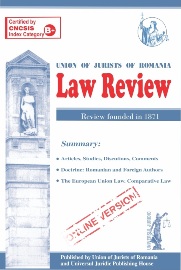UNIVERSAL JURISDICTION AND CONCURRENT CRIMINAL
UNIVERSAL JURISDICTION AND CONCURRENT CRIMINAL
Author(s): Mihaela Aghenitei, Luciana BobocSubject(s): Law, Constitution, Jurisprudence, Criminal Law, Civil Law, International Law, EU-Legislation
Published by: Universul Juridic
Keywords: Universal jurisdiction; Concurrent Criminal Jurisdiction; International Criminal Tribunals; conflict of jurisdiction;
Summary/Abstract: The Princeton Principles on Universal Jurisdiction define universal jurisdiction as “criminal jurisdiction based solely on the nature of the crime, without regard to where the crime was committed, the nationality of the alleged or the convicted perpetrator, the nationality of the victim, or any other connection to the state exercising such jurisdiction.” This is not the appropriate forum in which to attempt to define universal jurisdiction; a general understanding of the theory is essential to distinguish what universality is not, especially with respect to an assessment of conventional law. Both the Council of Europe and the European Union have legislated on the issue of concurrent jurisdiction and the solution of conflicts of jurisdiction. It is irrelevant whether the jurisdictional principle applied is universal jurisdiction or any other principle of jurisdiction: what matters is the fact that there is overlapping jurisdiction. But there is no country that would establish express “criteria” to decide upon competing national jurisdictions. According to the Rome Statute, International Criminal Court jurisdiction is complementary to national ones. The ICC cannot request the transfer of proceedings as long as they are pending in a domestic Court.
Journal: Law Review
- Issue Year: 2011
- Issue No: 01
- Page Range: 21-27
- Page Count: 7
- Language: English
- Content File-PDF

